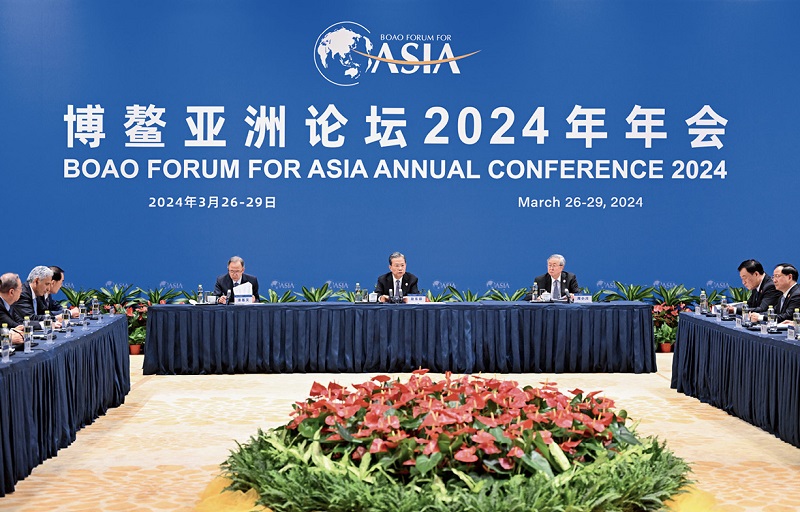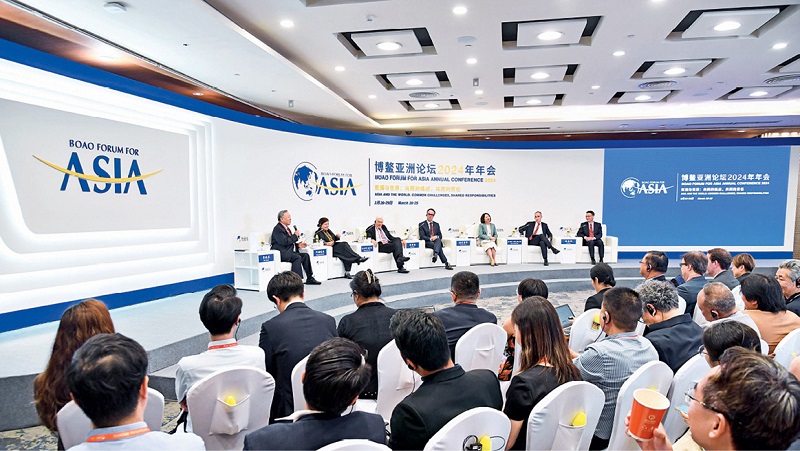As both a vanguardist and low-cost supplier of core green infrastructure, China is expected to unfold the strength of new quality productive forces.

Zhao Leji, chairman of the National People’s Congress Standing Committee, speaks during a discussion with representatives of Chinese and foreign entrepreneurs during the Boao Forum for Asia Annual Conference 2024 in Hainan, on March 27, 2024.
The Boao Forum for Asia (BFA) Annual Conference 2024, held on China’s southernmost island province of Hainan under the theme “Asia and the World: Common Challenges, Shared Responsibilities,” concluded on March 29. The concepts and initiatives raised at the four-day event, however, have continued to reverberate across Asia and beyond.
On March 28, China’s top legislator Zhao Leji delivered a keynote speech at the opening plenary of the Forum – referred to by some as the Asian Davos, calling on all countries to rise above the outdated mentality of bloc confrontation and zero-sum game, practice true multilateralism, and jointly build an open world economy.
The 2,000 BFA participants included heads of international organizations, current and former dignitaries, CEOs, and various VIPs from over 60 countries and regions, in addition to 1,100 representatives of major media outlets across the globe.
Focusing on the four main themes of “World Economy,” “Technological Innovation,” “Social Development,” and “International Cooperation,” the conference discussed macroregional issues from the perspective of Asia and Asian interests, as well as that of other regions, and globally.
The challenges facing the world today are complex, and only by jointly meeting them, shouldering the responsibilities and strengthening cooperation can the world continue to move on the track of peace and prosperity, said Li Baodong, secretary general of the BFA, at the first press conference for the event on March 26.
He noted that through discussions at the conference, BFA hopes to pool the wisdom of all parties, unite the strength of all, and overcome difficulties and create a better future.
Panel discussion touched on such topics as promoting investor confidence and advancing financial cooperation in Asia to enhance its growth, as well as strengthening industrial and supply chain cooperation among Asian member countries to boost the real economy.
Hot topics, such as global AI governance, the future of new energy vehicles, and how to consolidate what is now regarded as “high-quality Belt and Road cooperation,” were also high on the agenda. A main goal of the Forum was indeed to put forward and help coordinate more Asian solutions, and play a proactive role in that regard through back-and-forth across the board interlocutions.
The subforums’ panel discussions also addressed larger topics, such as Global Security Initiative and how to deal with the fragmentation of global trade.
The urgency of green and low-carbon development was underlined by the event’s green transport and catering. Meanwhile, the “Boao near-zero carbon demonstration zone,” installed at the BFA International Conference Center, showcased China’s green and low-carbon development concepts, technologies and practices. These were crystallized in the country’s huge investment in renewables that, in 2023, accounted for a global 58 percent of newly installed solar power capacity and 60 percent of the world’s new wind capacity, according to Bloomberg News.
The high-tech BFA conference center, including a parking lot equipped with photovoltaic power generation facilities and charging piles for new energy vehicles, organic waste treatment facilities, wind energy collectors, and an energy storage system constructed with photovoltaic tiles, was powered by Hainan’s first 5G-A, equivalent to 5.5G mobile communication networks.
This was an apt backdrop to China’s commitment – and national goal – to achieve carbon emission reductions, as confirmed by Beijing’s top diplomat Wang Yi at the press conference following the conclusion of the "Two Sessions” weeks earlier.

A sub forum themed “Investing in the Future of Asia” during the Boao Forum for Asia Annual Conference 2024 is held in Boao, Hainan, on March 26, 2024.
The Boao near-zero carbon demonstration zone highlights the transitioning of the Chinese economy’s new drivers of growth into a greener era. It moreover demonstrates the zone’s paradigmatic nature for large parts of the Global South, which is also transitioning into a greener era, to varying degrees, from rural to urban environments, or containing both. Boao’s inspiring technological compass might thus also serve the Northern Hemisphere.
Given that “there is no way that the world could go green without China,” as observed by former executive director of the UN Environment Program Erik Solheim in a China Daily interview in March, Boao has reaffirmed China’s capacity to play a dual role: first, inspiring countries to go green more rapidly; and second, increasing direct investment in those very countries.
Founded in 2001, the BFA is a non-governmental, non-profit international organization initiated by 29 member states. With east, south east, southern, and central parts of the continent represented, the BFA exerts a significant influence. At the international level, the 2024 Global Diplomacy Index, published in late February by Australia’s Lowy Institute, ranks China’s diplomatic network as the world’s most expansive, with 274 posts around the world – an achievement that entails important responsibilities. Amid so many issues and crises, the world needs more dialogue and negotiation. That Asia has a say in the emerging multipolar world we are witnessing is abundantly clear.
The truism stating that, in the 19th century the world was Europeanized; in the 20th century, it was Americanized; and currently, in the 21st century, the globe is being irreversibly Asianized, invocated by Parag Khanna in his book The Future is Asian, is a prediction as valid in 2024 as when it was published in 2019.
With hindsight and perspective, Singapore’s former ambassador to the UN Kishore Mahbubani, and for many years a distinguished speaker at the Baoao Forum, reminds us in his book, The Asian 21st Century, that Western predominance during the last 200 years of world history has been “an aberration,” and that what we are seeing in the 21st century “is the end of the aberration and the return of the normal, where China, India, and other Asian countries are once again emerging as the largest economies in the world."
If China’s growth is predicted at around 5 percent in 2024, with Asia as a whole reaching 4.7 percent, according to the International Monetary Fund (IMF) regional economic outlook update for Asia and the Pacific on January 31, it means that the continent remains on track to drive about two-thirds of global growth in 2024. Will the world economy abide by such a positive trend, in accordance with Boao’s main hopes this year? Certainly, it is too early to say. But what appears to be a growing consensus among prestigious observers is that, as both vanguardist and low-cost supplier of core green infrastructure over the coming decades, the world needs China to unfold what Beijing defines as “new quality productive forces,” which implies moving up the value chain.
In the 1980s, Baoao in the Hainan Island seemed the most improbable location wherefrom to gain future global significance. Back then I toured the island on different occasions. Baoao, meaning “abound in big fish,” was where industrious fishermen and farmers, working according to traditional methods and concepts of time, converged. That it would one day constitute a vanguardist venue of a panel discussion – among others – on the rise of new energy vehicles (NEVs) was unimaginable. It is relevant, however, to highlight that Hainan Province announced a plan in 2022 to ban the sales of all petrol vehicles by 2030, making it the first Chinese province to lead the clean energy transition in that field. 
AUGUSTO SOTO is director of the Spain-based Dialogue with China Project.